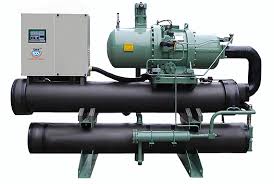Introduction
In the chemical processing industry, chillers play a crucial role in maintaining optimal temperatures for various chemical reactions, preserving product quality, and ensuring equipment reliability. To keep chillers running efficiently and avoid costly downtime, a robust maintenance program is essential. Regular and preventive maintenance helps in extending the lifespan of the chiller, improving energy efficiency, and minimizing operational disruptions.Industrial Chillers
Best Practices for Chiller Maintenance:
Regular Inspection and Cleaning of Heat Exchangers
- Heat exchangers are vital for efficient heat transfer. Over time, they can become fouled by contaminants, reducing efficiency and causing increased energy consumption.
- Schedule regular inspections and clean the heat exchangers to remove scale, debris, and buildup. Chemical cleaning may be necessary in some cases to remove stubborn deposits.
Monitor Refrigerant Levels
- Proper refrigerant levels are critical for the chiller’s cooling performance. Low refrigerant levels can lead to inefficiencies and potential damage to the compressor.
- Regularly check and maintain optimal refrigerant levels. If refrigerant levels drop, inspect for leaks and repair them promptly.
Inspect and Maintain Water Treatment Systems
- In water-cooled chillers, the quality of the water circulating through the system directly affects the chiller’s performance. Poor water quality can lead to corrosion, scaling, and biological growth.
- Implement a water treatment program to control the pH, hardness, and microbiological content of the water. Regularly test and adjust water treatment chemicals to prevent scaling and corrosion.
Check and Replace Filters
- Filters in the chiller system can become clogged with dust, debris, and particulates, reducing airflow and system efficiency.
- Inspect and replace air and water filters at regular intervals to maintain optimal performance and airflow through the system.
Lubricate Moving Parts
- The moving components of a chiller, such as compressors, pumps, and motors, require proper lubrication to function smoothly and prevent excessive wear and tear.
- Follow the manufacturer’s recommendations for lubrication schedules and use the appropriate type of lubricant for each component.
Calibrate Sensors and Controls
- Accurate temperature, pressure, and flow sensors are crucial for maintaining optimal chiller performance. Miscalibrated sensors can result in improper cooling and energy inefficiencies.
- Regularly calibrate sensors and control systems to ensure they provide accurate readings. This helps in maintaining the desired operating conditions and prevents energy wastage.
Monitor and Manage Oil Levels
- The oil in the chiller’s compressor is crucial for reducing friction and preventing overheating. Inadequate oil levels can lead to excessive wear and damage to the compressor.
- Regularly check the oil levels and quality. Replace the oil as per the manufacturer’s guidelines and ensure that oil filters are clean and functioning properly.
Regularly Test Safety Controls
- Safety controls, such as pressure relief valves, high-pressure switches, and temperature sensors, are essential for the safe operation of the chiller. Malfunctioning safety controls can lead to dangerous situations.
- Test all safety controls at regular intervals to ensure they are functioning properly. Replace or recalibrate any faulty controls immediately.
Plan for Seasonal Maintenance
- Chillers may experience different operating conditions based on the season. Preparing the chiller for seasonal changes helps to optimize performance and prevent issues.
- Implement a seasonal maintenance schedule that includes tasks such as checking for freeze protection in winter or ensuring optimal cooling capacity during summer months.
Training for Operators
- Properly trained operators are essential for the effective operation and maintenance of chiller systems. Misoperation can lead to damage and reduced efficiency.
- Provide regular training sessions for operators to ensure they are knowledgeable about chiller operation, safety protocols, and maintenance procedures. This reduces the risk of human error and improves overall system reliability.
Effective chiller maintenance in the chemical processing industry ensures that the system operates efficiently, reliably, and safely. By following these best practices, companies can avoid unexpected downtime, reduce energy costs, and extend the lifespan of their chiller systems.

